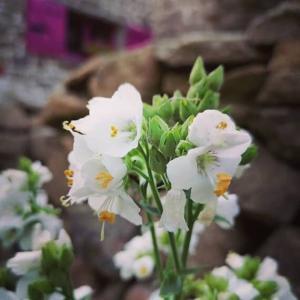“I cannot build my faith upon Author’s words, nor believe a thing because they say it, and could wish everybody were of my mind in this, to labour to be able to give a reason for everything they say or do.”
There it was, this beautiful catchphrase that spoke to me like it was the answer to a serious question that has been bothering me every now and then, with varying stages of importance, searching for something like my life’s motto. As usual, the answer has been around for literally ages, it just took me some time to find it.
It was written down by Nicholas Culpeper, a 17th century English botanist, herbalist, physician and astrologer. His book Complete Herbal dates from 1653 and it is a store of pharmaceutical and herbal knowledge that I often consult, but before today I never got around to reading his original ‘Epistel to the reader’. So thanks Nicholas, thanks you for starting my day with this exclamation of amazement.
I picked up Complete Herbal to research this thriving stranger in our garden that we did not plant ourselves but who suddenly appeared this spring. It turns out to be Greek Valerian (Polemonium coeruleum), found in blue or white, not a true Valerian at all, but belonging to the natural order Polemoniaceae, the family of the Phloxes. It’s also commonly called Jacob’s Ladder, derived from its successive pairs of leaflets. Cats supposedly are nearly as fond of the smell of this plant as of the true Valerian, and will frequently roll on it and injure it, but I haven’t seen Saffron nor Rebel vandalising it so far, while that is usually their favourite pastime, vandalising.
There are few known modern medicinal uses of Jacob’s ladder. Native Americans would treat colds, coughs and ailments of the lungs with an infusion that was made by drenching the roots in wine. Culpeper writes: ‘It is under Mercury, and is alexipharmic, sudorific, and cephalic, and useful in malignant fevers and pestilential distempers; it helps in nervous complaints, headaches, trembling, palpitations of the heart, vapours, etc. It is good in hysteric cases, and epilepsies have been cured by the use of this herb.’
Good in hysteric cases, now isn’t that useful information? But since I cannot build my faith upon author’s words, I better fire up my dehydrator and start harvesting. I’ll obviously keep you informed.



Your blog is engaged with the here and now in a different way than this city guy, but the love of life and detail is the same.
Thought you’d enjoy The Gentle Author’s friend’s take on Nicolas Culpeper.
https://spitalfieldslife.com/2020/04/30/nicholas-culpeper-herbalist-of-spitalfields/
Thank you! Very interesting indeed.